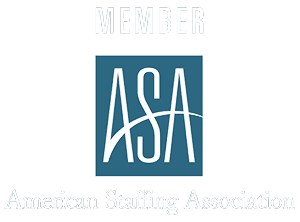Beyond the pizza parties and office perks, today’s IT professionals are looking for real benefits that support their careers and well-being. With about 90 percent of tech leaders struggling to recruit and retain talent—and 72 percent concerned about meeting workers’ broader needs, salary alone isn’t cutting it for top talent.¹
Staffing firms that succeed in 2025 will be offering comprehensive benefits like healthcare, retirement plans, flexible work arrangements, and professional development opportunities. Without these, staffing firms risk longer time-to-fill rates, lower redeployment, and lost revenue from unplaced candidates.
At the same time, offering competitive benefits isn’t always easy. Boutique and mid-sized staffing firms face high insurance premiums, complex multi-state compliance issues, and heavy administrative workloads, making it challenging to compete with larger employers.
So, knowing what makes a strong benefits package in IT staffing is key to attracting talent and keeping clients satisfied. While offering competitive salaries is important, firms can stay ahead by using cost-effective strategies to enhance their benefits and remain competitive.
Why Benefits Matter in IT Staffing
While salary is important for attracting IT professionals, a strong benefits package is just as essential. In fact, research shows that about half of employees chose their current employers due to their benefit packages.²
When firms offer strong healthcare plans, retirement options, and work-life balance perks, top candidates are more likely to engage, making hiring easier. Plus, employees with solid benefits are more likely to stay, reducing turnover and keeping the workforce stable.
Most importantly, clients prefer staffing firms that manage benefits smoothly, reducing compliance risks and payroll challenges. Offering strong benefits helps firms stand out as trusted partners, delivering not just talent but smart workforce solutions for long-term success.
The Benefits IT Professionals Want Most
IT professionals are in high demand, and they know it. While competitive salaries matter, benefits can be the deciding factor in where they choose to work and whether they stay. The most sought-after benefits include:
- Health insurance: Comprehensive plans, including mental health coverage, are a top priority.
- Retirement plans: A strong 401(k) with employer matching makes a big difference.
- Flexible work options: Remote/hybrid work, flexible hours, and generous PTO appeal to tech professionals who value work-life balance.
- Professional development: Training, certifications, and career growth opportunities help IT talent stay ahead in a fast-changing industry.
Staffing firms that provide these benefits gain a competitive edge, making it easier to attract and keep top IT talent.
How Small IT Staffing Firms Can Offer Competitive Benefits
There are several promising solutions to offer competitive benefits to IT talent, from partnership with experts to group plans to outsourcing benefits. Here are some approaches that an IT staffing agency can take to offer competitive benefits:
1. Multi-State Hiring Capabilities Through Specialized Partners
Small IT staffing agencies often struggle to compete with larger agencies when it comes to benefits, especially when hiring across multiple states. However, strategic partnerships help firms offer strong benefits without any hassle.
Payroll, compliance, and benefits management can be complex as you operate in multiple states. Often, there are many factors to consider when handling them. To simplify these challenges, seek ways to partner with a Professional Employer Organization (PEO) or Employer of Record (EOR).
Having a dedicated partner in charge of handling and maintaining benefits across the different states you operate in ensures that you’re making the best benefits offers.
These partners are knowledgeable and equipped to manage payroll, tax filings, and compliance across different states. If you use these vendors, you can automate benefits management, assigning benefits suitable to respective clients and candidates as soon as you make a placement
Beyond benefits management, these partnerships enable your staffing agency to maintain compliance nationwide. This helps attract top IT talent, improve retention rates, and enhance the overall candidate experience—ultimately strengthening relationships with clients and positioning the firm as a trusted staffing partner.
2. Getting Enterprise-Level Benefits Without Breaking the Bank
Providing competitive benefits is key to attracting and keeping top IT talent. But for a small IT staffing agency, budget limits can make it hard to offer high-level perks. By using the following cost-effective strategies, firms can deliver strong benefits without breaking the bank:
Group Health Plans
Consider group health plans where candidates can access medical care for themselves or their dependents through lower-cost insurance and reimbursement options. Partner with industry associations, professional employer organizations (PEOs), or business groups to have access to group rates usually reserved for larger companies.
Alternatively, they can use Multiple Employer Welfare Arrangements (MEWAs) to pool resources and offer more affordable health plans.
Cost Sharing Models
Offering benefits doesn’t mean covering the full cost. Small firms can structure contributions to keep benefits appealing while staying financially stable. Clients can contribute a set amount toward employee benefits, allowing staff to select plans that fit their needs.
Health Savings Accounts (HSAs) and Flexible Spending Accounts (FSAs) offer tax-advantaged ways for employees to manage healthcare expenses while lowering payroll taxes for employers. When you explore these cost-effective approaches, you can offer valuable benefits without exceeding your budgets.
3. Transferring Employer Obligations and Compliance Risks
Are compliance risks putting your staffing firm at risk? Falling short on labor laws and benefits regulations can lead to hefty penalties, and the costs are only rising. In 2024, the Employee Benefits Security Administration (EBSA) recovered about $1.4 billion in direct payments due to benefits violations.³ That’s a clear sign that noncompliance isn’t an option.
If keeping up with labor laws and benefits regulations feels overwhelming, outsourcing HR and benefits management can help. One way to start is to partner with a PEO or EOR that has expertise in compliance and employer obligations like paid leave, overtime, and benefits. Let them deal with these responsibilities to ensure proper worker classification and keep your firm compliant without the extra baggage.
4. Focusing on Recruiting Instead of Paperwork
Staffing firms thrive when they focus on talent, not paperwork. Working with an EOR can mean outsourcing benefits administration to dedicate more time to what drives success. In fact, talent sourcing and relationship-building become easier when recruiters aren’t bogged down by compliance and paperwork. More time means stronger connections with top candidates.
Administrative tasks involving benefits include paperwork for enrolment, compliance, and reporting. The time, resources, and effort spent on these can quickly pile up and distract businesses from what they are supposed to be doing.
Handling off these tasks to an EOR will give you more time to engage client and build workforce strategy to understand their unique needs and provide tailored workforce solutions.
Business Results: Stronger Client Retention, Higher Candidate Satisfaction, and Cost Savings
The right benefit strategy supports employees and drives business strategy. Staffing agencies that offer competitive, well-managed benefits see measurable returns across key areas.
Stronger Client Retention
Client retention improves when you can consistently deliver a reliable, high-quality workforce. Clients prefer staffing partners who invest in their employees, reducing turnover and ensuring long-term placements.
Read More: 8 Game-Changing Techniques to Build Lasting Client Relationships
Higher Candidate Satisfaction
Better benefits equal higher candidate satisfaction. As seen earlier, about 54 percent of employers stay with their employer and 40 percent would leave their employers for better benefits elsewhere. A strong benefits package not only helps talent acquisition but also keeps them engaged, reducing costly turnover.
Cost Savings
A comprehensive benefits package can mean spending money, but the long-term cost it saves cannot be overlooked. Retaining employees and avoiding fines leads to a stronger bottom line, making your firm more financially resilient.
Offer competitive benefits with Signature Back Office
Offering competitive benefits is crucial, but finding affordable solutions can be challenging for IT staffing agencies. A strategic approach helps manage benefits while staying within budget.
That’s where Signature Back Office comes in. We help staffing firms offer competitive benefits. These solutions allow you to stay competitive, improve retention, and focus on business growth. Contact us today to make strong benefits simple and sustainable, without adding extra hassle.
References
- “EBSA Restores Nearly $1.4 Billion to Employee Benefit Plans, Participants, and Beneficiaries.” DOL, www.dol.gov/agencies/ebsa/about-ebsa/our-activities/resource-center/fact-sheets/ebsa-monetary-results.
- “The Grass Isn’t Greener for U.S. Employees as Majority Prefer to Stay in Their Current Jobs.” WTW, 4 June 2024, www.wtwco.com/en-us/news/2024/06/the-grass-isnt-greener-for-employees-as-majority-prefer-to-stay-in-their-current-jobs-the-grass#:~:text=While%20pay%20remains%20at%20the,security%20through%20the%20benefit%20package.
- Jarvis, David. “Tech Talent Is Still Hard to Find, Despite Layoffs in the Sector.” Deloitte Insights, 9 Nov. 2023, www2.deloitte.com/us/en/insights/industry/technology/tech-talent-gap-and-skills-shortage-make-recruitment-difficult.html.





